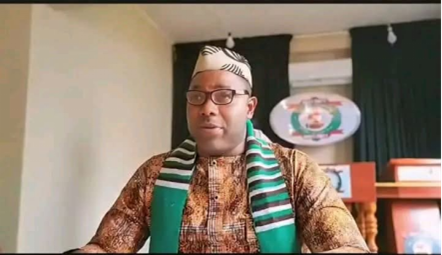The Unity Party (UP), Liberia’s ruling party, found itself embroiled in controversy following remarks made by its National Chairman, Rev. Luther Tarpeh, who referred to smaller political parties as “helping verbs.” This characterization sparked immediate backlash from political figures and critics, who interpreted the statement as dismissive and indicative of political intolerance. The incident prompted a swift response from the UP, which issued an official apology and clarification, aiming to mitigate the damage caused by the Chairman’s comments.
The controversy stemmed from an interaction between Chairman Tarpeh and Representative Musa Bility of the Citizens Movement for Change (CMC). Tarpeh explained that his “helping verbs” remark originated from a lighthearted exchange with Bility, during which he jokingly suggested Bility’s party should support the UP in the 2029 elections. He further elaborated that his comment was made in response to a journalist’s question and was intended to illustrate the historical dominance of the UP and the Coalition for Democratic Change (CDC) in Liberian politics. He pointed out that since the civil war, these two parties have effectively held a duopoly on power, with smaller parties frequently aligning themselves with either of the two major blocs.
The UP, recognizing the potential fallout from the Chairman’s statement, moved quickly to address the situation. The party’s National Coordinating Committee (NCC), acting on behalf of the National Executive Committee (NEC), issued a formal apology to all member parties of the Rescue Alliance, the ruling coalition. The statement emphasized that Chairman Tarpeh’s comments, made during an engagement with journalists in Nimba County, were intended to highlight the political realities of Liberia, not to diminish the importance of smaller parties. The UP reiterated its commitment to mutual respect and collaborative partnerships within the Rescue Alliance.
The official statement carefully contextualized Chairman Tarpeh’s remarks, explaining that his intention was to underscore the historical dominance of the UP and the CDC in national elections. The statement clarified that his observation about smaller parties aligning with these two major forces was not meant as a judgment of their value or significance. Instead, it was presented as an acknowledgment of the existing political landscape. The UP sought to reassure its alliance partners of their vital role in the current administration.
The UP explicitly expressed its gratitude for the contributions of the alliance parties, emphasizing their crucial role in bringing President Joseph Nyuma Boakai to power. The party highlighted the ongoing support these parties provide to the Boakai administration and affirmed its commitment to maintaining a strong and unified Rescue Alliance. This reaffirmation of the alliance’s importance was a key element in the UP’s strategy to contain the damage and reassure its partners. The party underscored its belief in the power of unity and collaboration in achieving its broader political objectives.
The UP’s official statement, signed by Lansana Pawenneh Fofana, the National Assistant Secretary General for Press, Publicity & Outreach, concluded with a call for unity and a focus on shared goals. The party urged all members of the Rescue Alliance to avoid actions that could undermine their collective strength and jeopardize the success of the government. The statement reaffirmed the UP’s unwavering commitment to the Rescue Alliance and its dedication to supporting President Boakai’s efforts to lead Liberia towards prosperity and stability. This appeal to unity served to reinforce the message that the UP valued its alliances and recognized their importance in achieving the nation’s goals.


